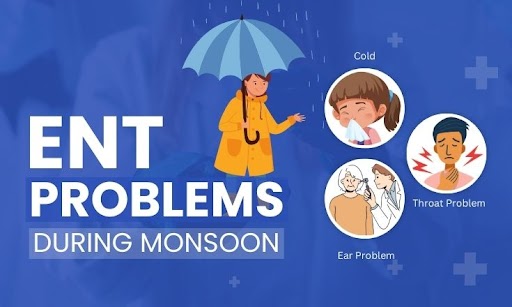Monsoons are very heartily welcomed and always have brought joy, abundance of life and vegetation but alongside comes illness and infections. Most of us are well aware of what to expect and dress accordingly, the unpredictability of the current monsoons and the heavy lashing from global warming is alarming and also the altered pH in the rainwater will affect your overall immunity.
Common ENT ailments
1. Ear: Fungal and bacterial infections of the ear are most commonly seen in monsoons due to the moisture in the air and humidity also the most common cause being using over the counter ear drops and self cleaning of the ears.
The old maids’ tails of using hot oils in the ear or starting a digging expedition with an ear bud or your fingers is only going to worsen the situation.
Incases of extreme pain in the ear treat it like pain in any other part of the body, take a pain killer for immediate relief, apply dry heat using a hot water bottle or a heat pack. Avoid using unprescribed eardrops despite any assurances from your family or pharmacists very rarely do they help mostly to worsen the situation. See an ENT Clinic in Gurgaon if the pain persists or in cases of blockage or recurrent itchy feeling in the ears.
2. Nose: The whiplash of hot and cold and the wetness will cause common colds and worsen allergies, and the monsoon will also aggravate sinusitis in people who have already succumbed to it.
Make sure to remain dry, avoid extreme temperature changes. Change into dry clothes whenever possible. Monsoons also tend to be a good breeding ground for fungus so ensure that there is no fungal growth in the house, explore the hidden corners and places that tend to accumulate water and humidity like bathrooms, drain areas and inside your cupboards.
Common cold is unavoidable and in a way increases your immunity so it is more than ok to get it once in a while and will take about 5 to 7 days to completely resolve, in this time period avoid transmitting it to others by maintaining good sanitary practices like hand washing, wearing a mask in public areas, avoid sharing your food and beverages and covering the nose and mouth while coughing and sneezing.
Patients who are immunocompromised should seek treatment at the onset of symptoms to prevent them from getting worse. If taking decongestants and saline nasal drops is not helping or if the cough or cold is progressing to fever then it is best to consult an ENT to rule out any underlying issue.
3. Throat: Monsoons also inspire a lot of foodies in us to venture out and try street food despite having a fair knowledge of the lack of good sanitation in our country. It is the worst season to drink unboiled tap water or use the tableware anywhere we eat outside unless we have a fair idea of the establishment that we are heading to.
Monsoons will also likely worsen allergic bronchitis and cough due to proliferation of fungal spores and general high air viscosity due to humidity. People who already suffer from chronic cough or bronchitis should always keep their inhalers handy and see their physician if the symptoms are persistent.
Tonsillitis and pharyngitis due to bacterial infections are also seen. They should always be treated promptly with the right antibiotic, over the counter consumption of antibiotics is an ignorant practice and should be avoided at all cost. It is always best to see a physician before you introduce an antibiotic into your system.
General precautions and healthy practices:
- Avoid getting drenched in the rains
- Avoid extreme temperature changes
- Change into dry clothes as quickly as possible
- Avoid eating or drinking from unsanitary places
- Consume a healthy diet
- Keep taking a Course of vitamin C to improve immunity

